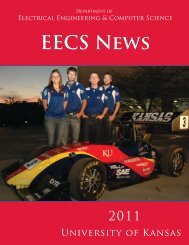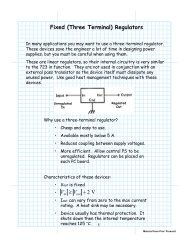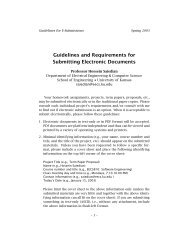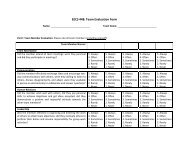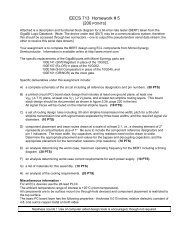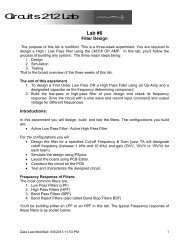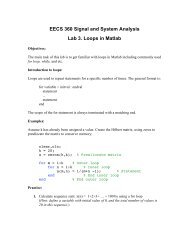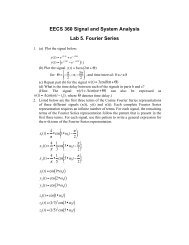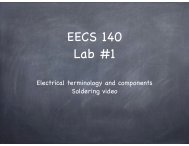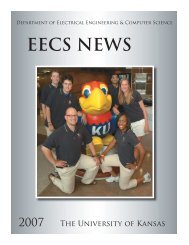Spring 2004 Handbook - Electrical Engineering and Computer ...
Spring 2004 Handbook - Electrical Engineering and Computer ...
Spring 2004 Handbook - Electrical Engineering and Computer ...
Create successful ePaper yourself
Turn your PDF publications into a flip-book with our unique Google optimized e-Paper software.
Emphasis on context-free, deterministic context-free <strong>and</strong> regularlanguages. Prerequisite: EECS 510 or EECS 805 or equivalent.EECS 720 Electromagnetics for Communications <strong>and</strong> Radar(3). Topics in electromagnetics relevant to wireless communications,optics <strong>and</strong> fiberoptics, radar <strong>and</strong> remote sensing. Subjects coveredinclude space waves, guided waves, radiation <strong>and</strong> antennas, scattering,electromagnetic properties of materials, <strong>and</strong> optics. Prerequisite:EECS 420 or equivalent.EECS 721 Antennas (3). Gain, Pattern, <strong>and</strong> Impedance conceptsfor antennas. Linear, loop, helical, <strong>and</strong> aperture antennas (arrays,reflectors, <strong>and</strong> lenses). Cylindrical <strong>and</strong> biconical antenna theory.Prerequisite: EECS 360, EECS 420, or EECS 720. Infrequentlyoffered.EECS 722 Mathematical Logic (3). Propositional Calculus. Firstorder theories <strong>and</strong> model theory. Elementary arithmetic <strong>and</strong> Godel’sincompleteness theorems. (Same as MATH 722) Prerequisite:MATH 765 or MATH 791, or equivalent evidence of mathematicalmaturity.EECS 723 Microwave <strong>Engineering</strong> (3-4). Survey of microwavesystems, techniques, <strong>and</strong> hardware. Guided-wave theory,microwave network theory, active <strong>and</strong> passive microwave components.The four-hour version of the course includes a laboratory.Prerequisite: EECS 420.EECS 735 Automated Theorem Proving (3). <strong>Computer</strong>-basedtheorem-proving methods for selected domains such as planegeometry, symbolic integral calculus, <strong>and</strong> propositional calculus arereviewed. Mechanical theorem-proving procedures for the first-orderpredicate calculus are studied in depth. Includes resolution, semanticresolution, hyper-resolution, linear resolution, <strong>and</strong> paramodulation.Applications of these procedures to areas such as proofs of programcorrectness, deductive question answering, problem solving, <strong>and</strong>program synthesis. Prerequisite: EECS 730 <strong>and</strong> a knowledge ofmathematical logic equivalent to that supplied by EECS 210.Infrequently offered.EECS 740 Digital Image Processing (3). This course gives ah<strong>and</strong>s on introduction to the fundamentals of digital image processing.Topics include: image formation, image transforms, imageenhancement, image restoration, image reconstruction, imagecompression, <strong>and</strong> image segmentation. Prerequisite: EECS 672 orEECS 744.EECS 741 <strong>Computer</strong> Vision (3). This course gives a h<strong>and</strong>s-onintroduction to the fundamentals of computer vision. Topics include:image formation, edge detection, image segmentation, line-drawinginterpretation, shape from shading, texture analysis, stereo imaging,motion analysis, shape representation, object recognition. Prerequisite:EECS 672 or EECS 744.EECS 742 Digital Video for Multimedia Systems (3). Anintroduction to digital video for multimedia systems. Topics includebasics of digital video, capture <strong>and</strong> non-linear editing, video featuredetection (temporal segmentation, motion estimation), content basedvideo classification, video compression techniques <strong>and</strong> st<strong>and</strong>ards(MPEG-1, 2, 4, 7), video streaming, <strong>and</strong> multimedia applications.Digital video tools <strong>and</strong> techniques will be utilized in severalprogramming projects. Prerequisite: EECS 740 or equivalent.EECS 744 Digital Signal Processing I (3). Discrete fouriertransforms, design of digital filters, fast fourier transform algorithms,<strong>and</strong> its application to signal processing, description of DSP chips <strong>and</strong>introduction to quantization error. Prerequisite: EECS 360.EECS 745 High Performance Integrated Networks (3).Processing requirements for integrated networks <strong>and</strong> associatedapplications. Principles of VLSI architectures. Overview of selectednetwork functions, including scrambling <strong>and</strong> descrambling, synchronization,cell switching, routing, b<strong>and</strong>width shaping <strong>and</strong> policing,encryption, <strong>and</strong> decryption. Implementation of network functionsusing high performance special-purpose architectures. Examples ofprocessors for high speed networks. Prerequisite: EECS 546 <strong>and</strong>EECS 663. Co-requisite: EECS 863.For students admitted <strong>Spring</strong> <strong>2004</strong>EECS 749 Knowledge Based Systems (3). General concepts ofintelligent problem solving, rule-based systems, reasoning underuncertainty, associative networks, model-based reasoning blackboards,object-oriented systems, case-based reasoning, induction, neuralnetworks. Students may not earn credit in both EECS 749 <strong>and</strong> CE 792.Prerequisite: EECS 649, EECS 730 or equivalent.EECS 750 Operating System (3). An analytical treatment ofthe structures <strong>and</strong> theoretical foundations of operating systems <strong>and</strong>related systems, <strong>and</strong> of their design <strong>and</strong> implementation. Cooperating<strong>and</strong> distributed processes, memory <strong>and</strong> store management strategies,resource sharing <strong>and</strong> queuing, concurrency control, <strong>and</strong> systemprotection <strong>and</strong> security. Other topics such as design methodologies,fault tolerance, languages for distributed programming, <strong>and</strong> communicationprotocols will also be discussed. Prerequisite: EECS 678 <strong>and</strong>one of EECS 461, MATH 526, or MATH 627.EECS 752 Concurrent Software Systems (3). Introduction todesign <strong>and</strong> implementation of concurrent (multi-threaded, parallel, ordistributed) software systems. The course examines problems <strong>and</strong>solutions common to all concurrent software, including interference,deadlock, consensus, resource allocation, coordination, global predicateevaluation, ways of expressing concurrency, concurrent I/O, debugging,fault tolerance, <strong>and</strong> heterogeneity. Prerequisite: EECS 448 <strong>and</strong> EECS678.EECS 753 Embedded <strong>and</strong> Real Time <strong>Computer</strong> Systems (3).This course will cover emerging <strong>and</strong> proposed techniques <strong>and</strong> issues inembedded <strong>and</strong> real time computer systems. Topics will include newparadigms, enabling technologies, <strong>and</strong> challenges resulting fromemerging application domains. Prerequisite: EECS 645 <strong>and</strong> EECS678.EECS 755 System Requirements Modeling <strong>and</strong> Analysis (3).Modern software engineering techniques for modeling <strong>and</strong> analyzingsoftware systems. Course coverage concentrates on pragmatic, formalmodeling techniques that support predictive analysis.EECS 761 Programming Paradigms (3). An investigation ofalternative programming paradigms <strong>and</strong> their representative effect onprogramming expressiveness <strong>and</strong> style. Emphasis is on a comparativeunderst<strong>and</strong>ing of a spectrum of programming paradigms, with somefacility in the use of at least one typical language representative ofeach paradigm studied. The course will review <strong>and</strong> investigate asappropriate imperative, functional, object-oriented, parallel, <strong>and</strong>logical programming paradigms, plus additional paradigms as relevant.Prerequisite: EECS 662 or EECS 807 or equivalent.EECS 762 Programming Language Foundation (3).Relationship between syntactic, static-semantic, <strong>and</strong> semanticstructures. Attribute grammars as models for static-semanticinformation processing. Survey of formal semantic models, includingoperational, denotational, <strong>and</strong> axiomatic examples. Related staticsemantic,semantic, <strong>and</strong> programming language issues. Prerequisite:EECS 662 or EECS 807 or equivalent.EECS 764 Analysis of Algorithms (3). Models of computations<strong>and</strong> performance measures; asymptotic analysis of algorithms; basicdesign paradigms including divide-<strong>and</strong>-conquer, dynamic programming,backtracking, branch-<strong>and</strong>-bound, greedy method <strong>and</strong> heuristics;design <strong>and</strong> analysis of approximation algorithms; lower bound theory;polynomial transformation <strong>and</strong> the theory of NP-Completeness;additional topics may be selected from arithmetic complexity, graphalgorithms, string matching, <strong>and</strong> other combinatorial problems.Prerequisite: EECS 660 or EECS 805 or equivalent.EECS 767 Information Retrieval (3). The objective of this courseis to give students a h<strong>and</strong>s on introduction to information retrievalsystems. Classic textual information retrieval systems are studied,followed by presentation of current research in the area. Topicsinclude: file structures, term-weighting schemes, text preprocessing,World Wide Web search engines, multimedia retrieval systems,artificial intelligence applications. Prerequisite: EECS 647 orpermission of instructor.EECS 773 Advanced Graphics (3). Advanced topics in graphics26



